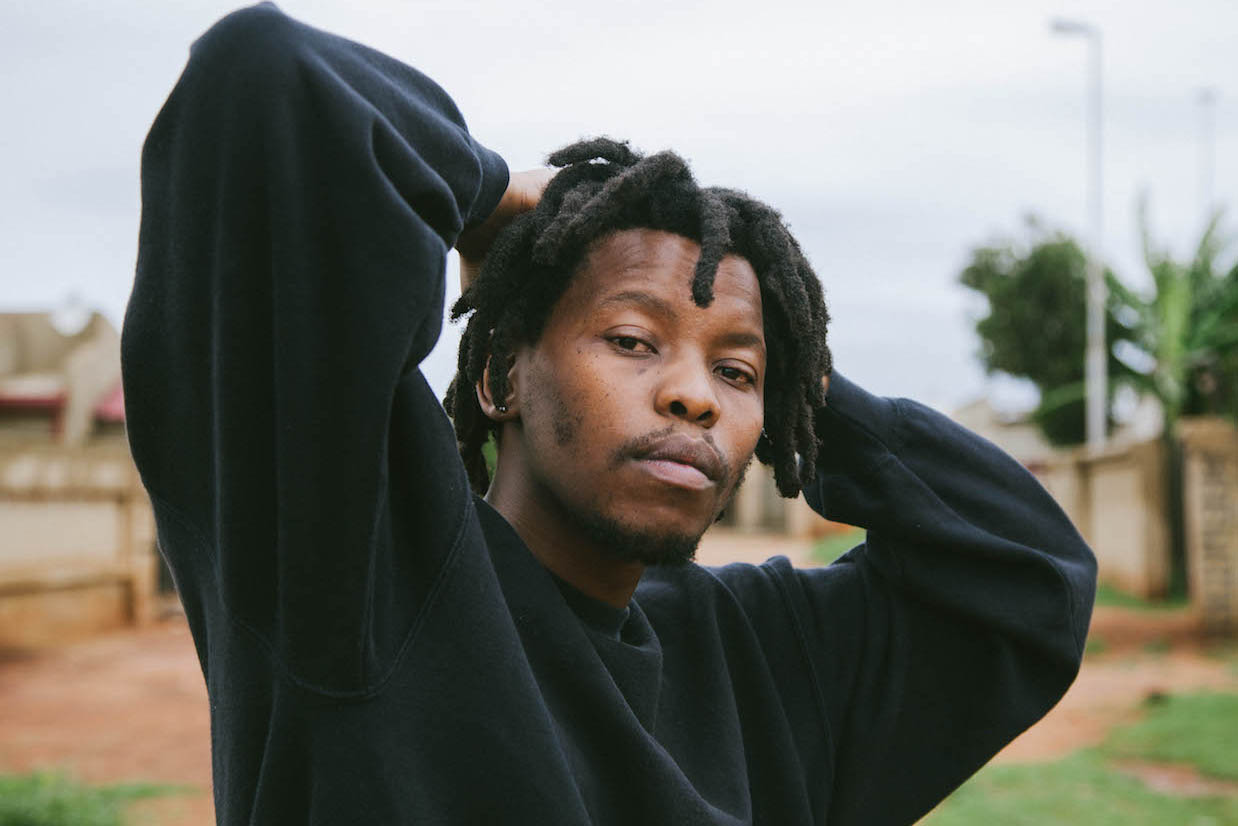The world of ASAP Shembe’s Insila
ASAP Shembe’s latest EP, Insila, tells the stories of his surroundings, paving the way to his debut album release.
Author:
9 April 2020

On 31 January 2020, ASAP Shembe released Insila, a four-track EP. It was his way, he says, of conquering fear, self-doubt. “Towards the end of last year,” he says, “I started being in my head too much. I received a lot of media coverage, and I started overthinking things. I got scared of releasing music.”
This fear came at the wrong time as he was working on his debut album. It is scheduled for release within the first half of the year. “So, before I could drop the album, I had to drop these songs first. I don’t want to be scared to drop the album as well. So, I had to let go of the dirt, of the fear.” Hence the project’s name. Insila means dirt, body dirt.
Insila and his previous EPs – Butter (2016), Inkinga (2017) and Butter 2 (2019) – are a prequel to the album on the way. In the past few years, Shembe has established himself as a sensitive, playful and experimental artist with a taste for genres that originated in South Africa. All these traits are exhibited on his latest release.
The hallmark of ASAP Shembe’s music is its roots in his reality. He sings about what is going on in his life and what he sees around him. Just like spirituality, money is a prevalent theme in Shembe’s music. In Insila, the tendency is maintained. Money is personified on Uthini, discussed in a skit on Ngaliwe and its effects explored in Mabhoya.
In the song Mabhoya, Shembe takes a tongue-in-cheek approach in his writing. He writes from the perspective of a fortunate individual living among the less fortunate. He sings:
If you hating on me,
probably, you got a problem with the money
Uhlanganise naw’uzame, (get up and hustle too)
khona nawe uzofana nami (so you can be like me)
The song, he says, was inspired by the young people who chill in street corners in Vosloorus, his hood, not doing any work and seemingly without prospects. “It’s like balling with the little necessities that you have,” he says. “Like ungazong’ chomela, ng’ceda uku-buy’ i-All Star (you aren’t better off than me, I just bought a new pair of All Star shoes). But, in the bigger framework of things, it’s like, what is it that you really have my G?”
It is not by coincidence that a young person gets fixated with advancing themselves financially in a country in which more than 40% of its youth are unemployed. About 8.2 million (40.1%) young South Africans between the ages of 15 to 34 are unemployed, according to recent figures released by Statistics SA. Many have even given up looking for jobs. It is this group upon whose troubles ASAP Shembe reflects. He croons, hoping to nudge them into action, saying it is possible to make some money through hustling without overlooking the challenges they are faced with.
A career pivot
Shembe doesn’t have a regular job. But his story is a little different to that of people who search for jobs to no avail. He left formal employment in 2017. He had worked in the banking sector for two and a half years. “My mom’s at that age where retirement is almost here,” he says when asked how his family responded to him leaving the comfortable world of permanent employment. “My stepdad wasn’t working anymore [when I quit my job]. So, the response was, what the environment was saying, like, ‘what are you doing right now, sibheke wena (we are relying on you)?’”
But it had to be done. “My goal wasn’t 100% clear,” he says. “So, I wasn’t communicating it clearly to my mom. I think that was one of the reasons why there was so much confusion as well. But, as I just threw myself into this thing deeper and deeper, before I could have the confidence to say what I truly want, what my plans are.
Related article:
“And when you’re able to communicate that to your parents, akekho umzali ongafuni ukuk’ supporta (not one parent wouldn’t readily offer their support). It’s just a matter of, ‘Talk to me, let me know where you’re at. Let me know how I can support you, however I can. But you’re a man, go figure your shit out and come back to us with a plan.’ And that’s where we are right now, my mom’s super proud of me. She’s super proud.”
Any mother would be proud if their son made appearances on MTV Base, Yo! MTV Raps SA and e.tv’s The Morning Show, on top of releasing a strong musical catalogue, among other achievements.
Independence and introspection
Just like most artists of his generation, Shembe is independent. He is responsible for most, if not all, of his achievements in the music industry. A realisation he recently had is that he is all he has. “I want to start doing my own shows,” he says. He looks up to artists like US rapper Russ who has managed to build a name without any support from both traditional and digital media, and Riky Rick whose festival Cotton Fest has, in just two years, become one of the most influential and important platforms for the country’s urban artists.
Judging from how often he brings it up, being honest in his music means a lot to Shembe, which is what independence has allowed. “I’m just trying to speak my truth,” he says. “I’m trying to live my process with the people that listen to my music, my process of figuring it out for myself in hopes that it will inspire those who listened to music to be able to figure it out for themselves. I’m going about it my way and hopefully that inspires whoever’s listening to go about it their way. The stories are serious, but the palette is not preachy.”
To make the stories being told in the songs on Insila compelling, none of the skits attached to the songs were staged. “All those things are real,” he says of the skits. Most of them are WhatsApp voice notes. “Obviously, I had to get permission from those people. Those are all genuine stories.” For instance, the woman on the skit of Ngaliwe is a close friend of Shembe’s. “After her mom passed on,” he says, “she had to go live with her uncles and her aunts. It was real at home. That’s real, coming from a super dysfunctional home and just coping with those things.”
Shembe’s surroundings didn’t just influence his lyrical content, but his sound, too. Sonically, his music might be prevalently trap (a popular subgenre of hip-hop); vocally, it references vintage South African genres such as maskandi, mbhaqanga, isicathamiya and even gospel – a trend popularised by South African artists like Jozi and Teargas in the late 2000s and early 2010s respectively, and, most recently, by the likes of Mashayabhuqe KaMamba and Sjava.
Related article:
For Shembe, though, it all started when he was growing up. His father ran an illegal liquor business. “All the mothers and fathers who worked in the kitchens and gardens would come to our house, Friday to Monday base mzini bayab’ shaya (they are home, drinking), trying to numb themselves or trying to just escape,” the artist said in a 2019 interview. “So, that’s where that connection to African music came from with me because that’s what would be playing a lot in the house, and the older I got, the more I got to see the messaging, what are they saying in this music, what’s the purpose of all that.”
Shembe uses his music as a form of self-introspection. It starts with his chosen stage name. “ASAP” has nothing to do with the popular US hip-hop collective A$AP. Instead, it’s an acronym for “Aba Sindisiwe Aba Pheli”, which means, “those who have been saved will never perish.”
The irony is that an artist whose name involves being “saved” and includes the name “Shembe” – the founder of Ibandla LamaNazaretha, also known as Shembe Church – doesn’t even go to church. “This is my church,” he says, as he plays some songs from his upcoming album and a snippet of an upcoming song in which he’s featured. All this in his bedroom studio in his parents’ house. He gets lost in his creation, his face contorting like people do when they catch the Holy Ghost in church.
“The mechanism that I’m using to relay my message is music,” says the artist, “and it’s really just like a constant reminder, mfethu, ukuthi you are your own saviour in this chaotic world. You need to find your truth, and I found my truth through this name.”


